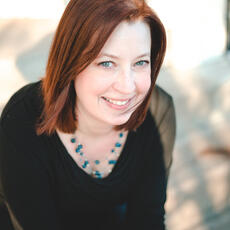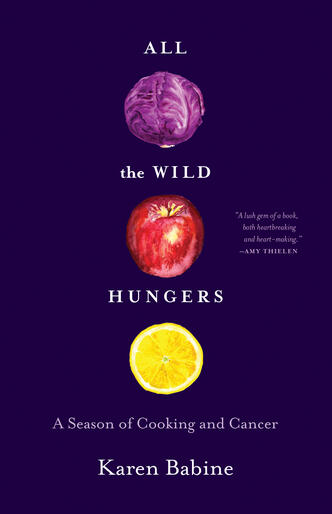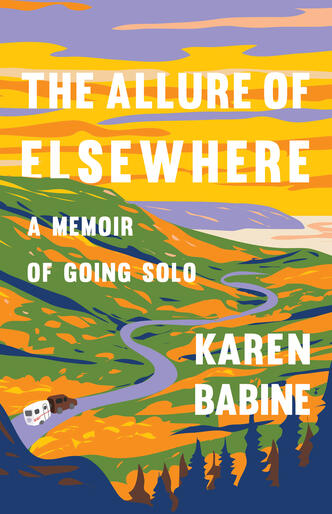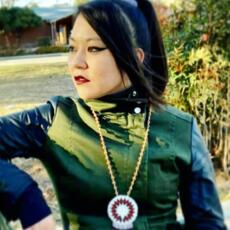Solitude Versus Loneliness: Celebrating the Launch of Karen Babine’s The Allure of Elsewhere: A Memoir of Going Solo
On Wednesday, May 21st, Milkweed hosted a book launch to celebrate the publication of Karen Babine’s newest memoir The Allure of Elsewhere: A Memoir of Going Solo. She was joined by journalist and fellow memoirist Marya Hornbacher. Together, they delighted in conversation on scamps, cats, and what it means to travel solo.
Tonight’s book launch is packed to the edges with attendees—it is all wiggle room and pressing elbows. Near the front of the crowd, Karen Babine stands haloed by her copper waves and celebratory glitter. As the designated Babine family historian, her launch has shifted into a kind of family reunion—solo travelers spot one another in the crowd, and her relatives volley flower bouquets between them. Whichever traveler you decide to be here tonight—whether called to isolation or tugged into the crowd of listeners—there is a space for everyone to feel seen by Karen’s memoir, her reading, and conversation with Marya Hornbacher.
Even Daniel Slager—Publisher and CEO of Milkweed—makes an appearance before Karen takes the stage. “How rare it is,” he reminds us, “for an author to win the Minnesota Book Award with her first two books,” he says, speaking to All the Wild Hungers and Water and What We Know.
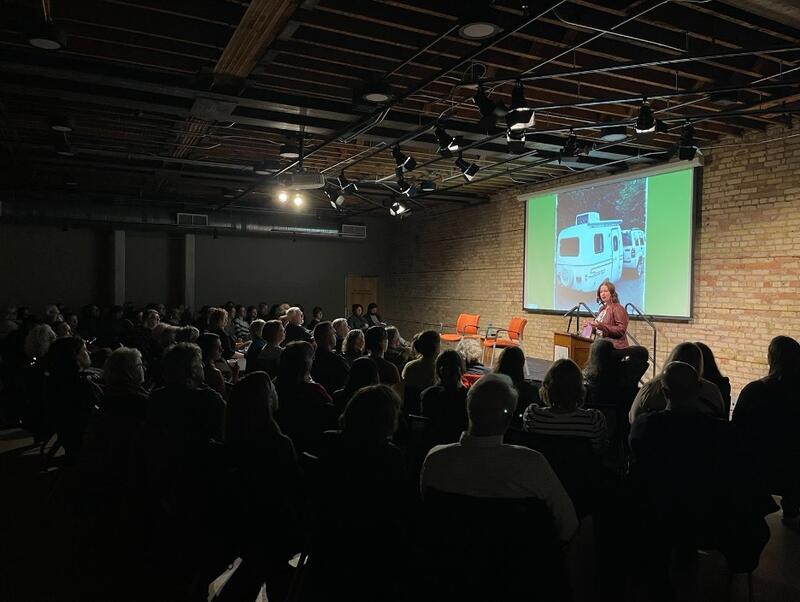
“How rare it is for an author to win the Minnesota Book Award with her first two books.” – Daniel Slager
With Daniel’s incandescent welcome, Karen launches into her reading with a certain decisiveness and blunt humor. Though her memoir is heavy with generational wounds, she packs deadpan sarcasm into the microphone and, before long, the crowd thrums with laughter.
Behind her, images carousel across the screen, from her retro-style scamp amid Minnesotan conifers to pebbled Californian shorelines. Though her memoir is a dedicated journey on ‘going solo,’ she isn’t entirely alone. Her cats, Galway and Maeve, curl into the corners of her montages. “We’re not in Minnesota anymore, Maeve,” Karen reads aloud and, on cue, the cat flickers on-screen, her paw impressed upon a map as if deciding their next destination.
As she ends her reading and tugs her chair closer to Marya, they launch into the immediate travel differences between them.
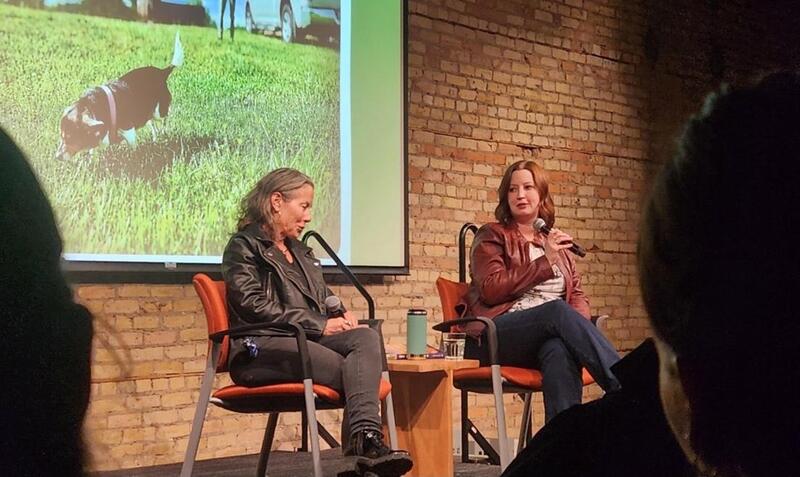
“We’re not in Minnesota anymore, Maeve.” – Karen Babine
Marya: For sure, there’s differences in the way we travel and camp. With Karen, there’s always a plan. Me, though? I’ve never had a plan.
Karen: Camping with a dog? People do it all the time. Cats, though, not so much. There weren’t a whole lot of long-range trips at first. In 2013, my sister finally asked, ‘why don’t you just travel?’ And I thought, ‘oh, I guess I could!’
Marya: Sometimes I’ll text, ‘where are you stopping tonight? And she’ll respond, ‘oh, I don’t know, a truck stop?’ Karen had a pre-existing history of camping. I didn’t have that. She was my go-to for learning. I was like, ‘Karen, I want to go scamping!’ So she helped.”
Just as Karen has shepherded Marya into the scamping scene, she’s now slowly ushering her nieces and nephews into camp-life, one road trip at a time. For her, creating new family memories has offered new chances to braid it with ancestral history.
Karen: I started camping with my oldest niece when she was five. Now it’s just a matter of waiting until the next ones are old enough. History is only boring until you remember that these used to be living people.
Marya: How did you know you were moving beyond something small, like a pet story for example, to ‘No, this is a book for a larger history and community’?
Karen: There were a couple of ways the storytelling was layered according to generational research. If you trace it far enough, you eventually connect to other people. On history, people love saying, ‘oh, that would never happen today—but that’s the thing, it could. History loves feeding into loops.
Marya: How do you make the shape of a story fit into the shapelessness of life?
Karen: It really did become the road as I worked out my family memories. One of the major pieces in this book is my great grandfather’s military life. As I pieced together his story, I realized they don’t just stop existing when we stop telling them. As the family historian, I’ll do the groundwork visiting archives.
Together, as they riff off each other’s spitfire comments and sharp candor, they invite questions from the crowd on embracing life as solo women, the art of antisocial companionship, and tempering fear with preparation.
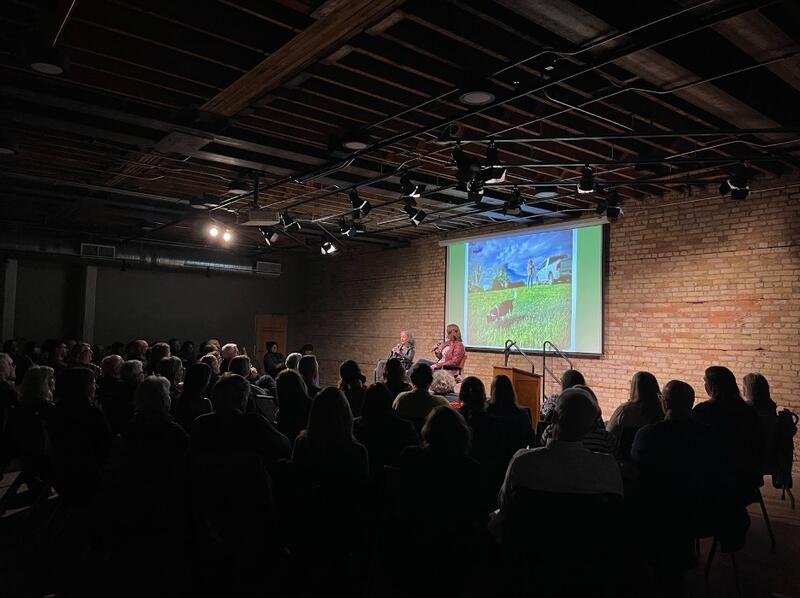
“As I pieced together [my grandfather’s] story, I realized they don’t just stop existing when we stop telling them. As the family historian, I’ll do the groundwork visiting archives.” – Karen Babine
Audience Question: When did you declare ‘I am a solo person’?
Karen: In my twenties, when I realized that I was more than just ‘single.’
Marya: I’ve been married a bunch of times—then I realized that I’m not enjoying it and I’m clearly not good at it. I like not knowing where I’m going to end up tonight, and I’d never want to inflict that onto someone else.
Audience Question: How did you two meet, and do you really check in every day?
Marya: We met as teachers, while my husband was undergoing major surgery. He was missing part of his skull—obviously I wasn’t okay. Karen asked, ‘what would taste good?’ I wasn’t thinking of nurturing myself, but she brought the best meal I’ve eaten.
Karen: Solo people don’t always get checked on. It evolved into a life-check. I’d think, ‘god damn it, where is she today?’ We reached a point when we asked, “what happens when one of us gets sick?”
Marya: Neither one of us had a plan.
Karen: …Now we do!
Audience Question: When you’re a woman, people assign fear to you. What has your experience been?
Karen: After you get enough miles in, you develop a gut instinct for what to avoid. You obviously keep moving. Inevitably some dude is like, ‘do you want me to park your camper for you?’ or mansplains a maneuver. I try to ignore them because, at this point, I’ve been doing this for fifteen years. I couldn’t just tell him off like my dad suggested. I was completely alone. That made him realize traveling solo for me is a totally different landscape.
Audience Question: Are you in connection with other solo women travelers?
Karen: I’m more antisocial when I’m on the road.
Marya: It speaks to solitude versus loneliness. We’ve never camped together, for example.
Karen: Part of it is finding people who match your frequency. When scamp rallies started happening, Marya texted ‘do you want to go to the scamp homecoming and be antisocial together?’ I thought, ‘yes, I do!’
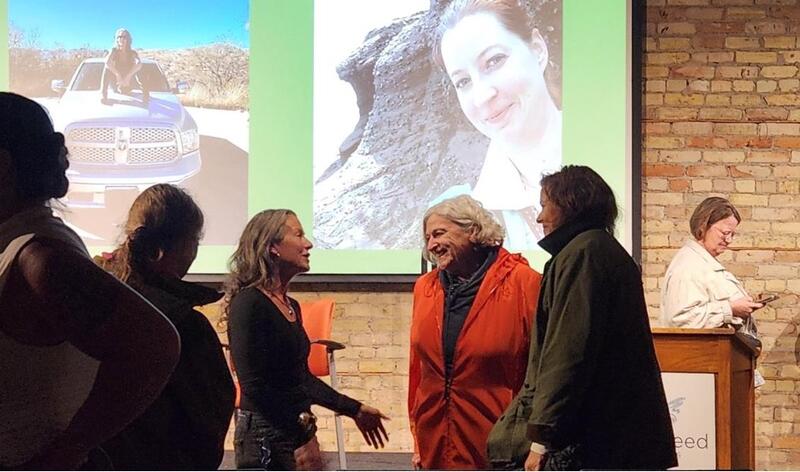
Accompanying her book launch, Karen has also released a playlist of her soundtrack on the road, which you can listen to here. For more on her previous books and interviews, please visit her author page.
